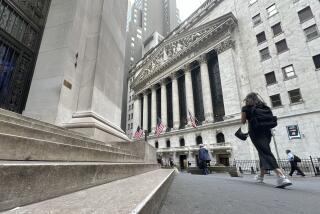Fed Chief’s Words Weigh on Markets
The second time around may be the charm for Federal Reserve Chairman Alan Greenspan: His cautionary statements Wednesday about financial markets’ exuberance helped fuel another broad sell-off in stocks, bonds and the dollar on Thursday.
The Dow Jones industrial average sank 58.11 points to 6,925.07, bringing its two-day loss to 1.6%.
In the Nasdaq market of mostly smaller stocks, the technology sector--until recently one of Wall Street’s hottest areas--was hit hard by selling, driving the Nasdaq composite index to its biggest one-day loss since last July.
The index lost 27.89 points, or 2.1%, to 1,312.66, its lowest level since Jan. 3.
“Greenspan’s fingerprints are all over this market,” said James Weiss, deputy chief investment officer at State Street Research & Management Co.
Clearly worried about a possible speculative bubble in the recently surging U.S. stock market, Greenspan said in Senate testimony on Wednesday that the Fed must be vigilant about “excessive optimism” that creates financial “imbalances” dangerous to the economy.
He appeared to be trying to jawbone the stock market lower--an attempt he also made in a speech Dec. 5, without much success: The market soared again in January and in recent weeks, powered in part by record cash flows into stock mutual funds.
“Greenspan is trying to warn investors to carefully consider what they are doing,” said Michelle Laughlin, a market analyst at Prudential Securities.
The central bank chief also put the bond market on notice Wednesday that the Fed could decide to raise short-term interest rates even before it sees proof that inflationary pressures are building in the U.S. economy, which has been growing at a surprisingly fast pace in recent months.
On Thursday, the government reported that orders to U.S. factories for big-ticket durable goods shot up 3.6% in January, the largest advance since September.
The threat of a Fed credit-tightening move pushed bond yields higher for a second day. The yield on the two-year Treasury note rose to 6.08% from 6.04% on Wednesday and 5.87% on Tuesday.
The 30-year T-bond yield ended at 6.80% Thursday, up from 6.78% Wednesday and 6.66% on Tuesday.
William Gross, who manages $75 billion in bonds at Pimco Advisors in Newport Beach, said Greenspan’s choice of words suggested that a rate increase may be closer than the market expected just two days ago.
Meanwhile, the dollar fell sharply against the Japanese yen on Thursday, losing support despite the potential for higher U.S. interest rates.
The dollar slumped to 120.69 yen in New York, down from 122.13 on Wednesday and the lowest since Jan. 28. Traders cited growing fears that Japanese companies will sell dollar holdings to bring yen home before March 31, the end of the fiscal year.
In the stock market, analysts said some investors were obviously taking profits because of Greenspan, fearing that he might resort to tighter credit in part to push stock prices down to more “reasonable” levels.
Losers outnumbered winners by 16 to 9 on the New York Stock Exchange and by 23 to 17 on Nasdaq.
But the hard-hit technology sector also faced other problems Thursday: Investors reacted badly to computer networker 3Com’s takeover offer for modem maker U.S. Robotics, hammering 3Com stock down nearly 10% on concerns that the deal is ill-considered.
Still, some analysts took a positive view of stocks’ pullback. “This is healthier than what we would have seen if the market had continued blindly higher,” said Peggy Farley, chief executive at Amas Securities. “The market has tended to get a little ahead of itself, and I think we’re seeing a reassessment, not a great big correction.”
Among Thursday’s highlights:
* 3Com’s poorly received takeover bid drove its stock down 4 to 35 and U.S. Robotics’ down 1 7/8 to 59 1/8. Among other computer networkers, Ascend Communications plunged 5 3/8 to 57, Cascade Communications fell 2 1/2 to 30 1/8, Cisco Systems sank 3 1/16 to 55 1/16 and Xylan lost 2 to 18 7/8.
* Elsewhere in the tech sector, Dell Computer tumbled 5 5/8 to 70 1/8, Microsoft fell 4 1/8 to 96 1/8, Intel dropped 6 41/64 to 137 47/64 and IBM slumped 3 7/8 to 143.
Among the day’s biggest losers, Citrix Systems plummeted 15 5/8 to 10 5/8 after the firm warned Wednesday that it could face increased competition from Microsoft.
* Financial stocks dropped on worries about higher interest rates. Chase Manhattan Bank lost 2 3/8 to 100 7/8, BankAmerica fell 3 1/2 to 115 7/8 and Merrill Lynch gave up 1 1/8 to 94 5/8.
* McDonald’s tumbled 1 3/8 to 43 1/2, continuing to sink on news that the firm is launching major price cuts on some of its sandwiches, to regain market share.
* Oil stocks sank again with another drop in oil prices. Exxon slumped 2 1/4 to 99 7/8, Unocal fell 1 to 38 1/2 and Amoco lost 1 1/2 to 84 3/8.
* On the plus side, gold and other metal stocks leaped as some investors reached for “safe haven” investments. March gold futures jumped $5 to $360.60 an ounce.
Market Roundup, D6
* FLOW INTO FUNDS
Stock fund inflows have slowed in February after hitting a record high in January. D6
More to Read
Inside the business of entertainment
The Wide Shot brings you news, analysis and insights on everything from streaming wars to production — and what it all means for the future.
You may occasionally receive promotional content from the Los Angeles Times.










